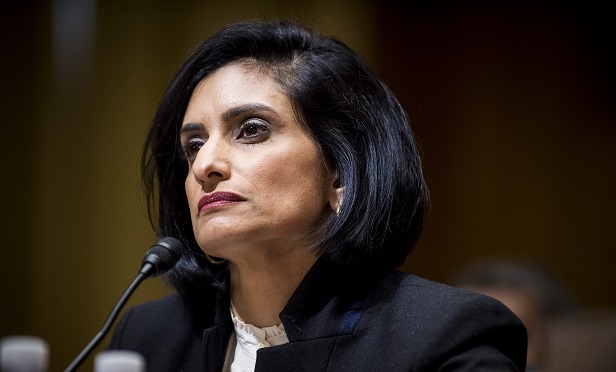 "Today's action is just the latest in a series of flexibilities CMS has extended to health insurers to help them support their enrollees during this unprecedented time," CMS administrator Seema Verma said. (Photographer: Pete Marovich/Bloomberg)
"Today's action is just the latest in a series of flexibilities CMS has extended to health insurers to help them support their enrollees during this unprecedented time," CMS administrator Seema Verma said. (Photographer: Pete Marovich/Bloomberg)
While the American economy falters, health insurers had a record Q2, driven by a marked decrease in health care utilization among consumers. But what to do with all of that excess revenue? On Tuesday, the Centers for Medicare & Medicaid Services announced that it would allow insurers in the individual and small-group markets the flexibility to reduce premiums for the remainder of the year.
"Throughout the COVID-19 pandemic, the Trump Administration has taken a whole-of-America approach, including working with our private partners, to ensure that the entire healthcare system is activated in our efforts to protect the American people," said CMS Administrator Seema Verma. "Today's action is just the latest in a series of flexibilities CMS has extended to health insurers to help them support their enrollees during this unprecedented time."
Recommended For You
Consumers likely would have seen a return on their premium payments for 2020 anyway, as part of the medical-loss ratio provision of the Affordable Care Act, which requires insurers to spend a certain percentage of their revenues on patient medical care. The CMS has already approved insurers' "repaying" some of those expected rebates, but the latest move will offer more immediate relief to Americans struggling financially.
Individual states may have their own regulations that prohibit insurers to change premiums mid-year, but the CMS is encouraging states to go along with its policy of "relaxed enforcement," writing, "CMS encourages states to adopt a similar approach and, under this temporary exercise of enforcement discretion, will also not consider a state to have failed to substantially enforce applicable federal requirements under the Public Health Service Act (PHS Act) or the Patient Protection and Affordable Care Act (PPACA) if the state permits issuers to provide premium credits in the manner outlined in this bulletin."
© Touchpoint Markets, All Rights Reserved. Request academic re-use from www.copyright.com. All other uses, submit a request to [email protected]. For more inforrmation visit Asset & Logo Licensing.







